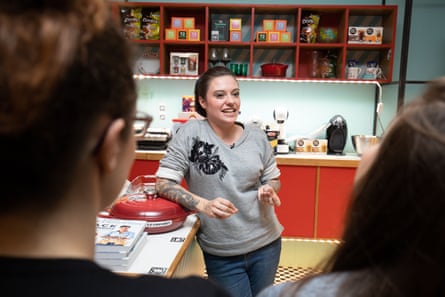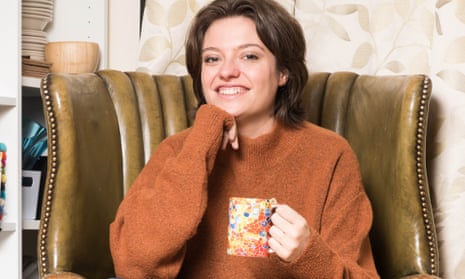On 27 December 2018, at 4 o’clock in the morning, I shifted uncomfortably on my small sofa in the freezing cold living room of my messy rented bungalow. I’d passed out mid-bingeing on Richard Curtis films and whisky an hour or so before. My shoulders screamed in agony, my mouth was dry and gasping, my head was pounding. I put my feet on the floor and faceplanted the carpet, so shuffled to the bathroom on my stomach, falling asleep again on the linoleum floor, clutching the toilet bowl.
Alcoholism had crept up on me, disguised as a friend to ease the social anxieties of newfound minor fame, a lubricant for awkward situations and parties where people I recognised from television peered over my shoulder while making small talk, looking for someone more noteworthy to flit off to chat to. I filled in trauma wounds with ethanol, I became louder, bolder, wearing my booze-soaked persona like armour against impostor syndrome and rooms full of thinner, more beautiful people.
I found myself pinned to walls by household-name male journalists, who forced their hands inside my shirt and tongues in my mouth, while telling myself I had asked for it, getting in that state. I lost count of the number of boozy lunches with people I considered peers and colleagues that ended with disquieting gropes in the back of taxis and the niggling feeling that I should really stop allowing myself to be so vulnerable.
That morning I lifted my head from the floor and threw up half a dozen times, guilt and grief and self-loathing wracking every trembling, retching pore of my body. I think I have a problem, I slurred to myself as I sank back to the ground, covered in vomit and sweat.
I decided, then, that I would go sober. I’d tried before, in secret, tipping all of the household booze down the sink and counting the days on one hand until I slipped up again. So, this time, I decided to let everyone else in on it. Not for glory, but for accountability. If everyone knew, there would be nowhere to hide. Nowhere to hole up and order a sneaky glass of wine or two. No excuses, no yellow cards.
I walked into my local shop on 6 January 2019, and the owner called me by my name. “You’re famous!” he laughed, not unkindly, wielding a copy of that day’s Observer at me. There I was, on the front page, declaring myself an alcoholic, for all the world to see. I took a deep breath. “Yes, that’s me. And I don’t want you to serve me alcohol ever again. It doesn’t matter what I say, how much I ask, if I say it’s for someone else, just don’t serve me.”
He nodded, understanding. I bought my paper and fled, embarrassed and ashamed. I hadn’t expected it to be so prominent, but it was done now, and there was no going back.
I slotted a piece of paper into my passport, with the words “Do not serve me – I am an alcoholic” in block capitals, and carried it everywhere. I used it twice. Both times, I burned with shame as the cashier read it, scanned my face for the moment of realisation and handed it back, sweeping the bottles of booze out of my basket and placing them out of reach behind the counter. “Just go to the meetings, you don’t need to tell everyone you meet that you’re an alcoholic,” my then sponsor sighed at me.
I found a new sponsor; one with less interest in squeezing my thigh and referring to our meetings as “dates”. I found online meetings, plugged in to women-only groups with recovering alcoholics from around the world from the comfort of my garden chair or burrowed beneath my duvet. The convenience of being dialled into group chats with strangers, avoiding the glances or trying to place where we may have run into each other before, worked for me.
And I did need to tell people. Because in my line of work there are always invitations, open bars, long nights and swanky clubs you can slip into if you know the right B-lister and are considered worthy of their company. Coming out publicly was difficult, and damaged some of my friendships and strained some family relationships, but I did it to be held accountable. And for the most part, it worked.
When I launched my book Tin Can Cook at a pop-up kitchen in Hackney in the spring, my agent and longtime friend Rosemary brought me a bottle of rose lemonade. My friend and publicist, Jess, turned up with a blend of herbal tea and lemonade she had seen me post about on Instagram.
For a friend’s book launch later in the year, her publisher reassured me in the invitation that all of the drinks would be non-alcoholic. At my favourite private hideaway in Soho, the bar staff no longer took my order, but presented me with a double espresso and a large glass of kombucha as soon as I sat down.
I owe the greatest debt of gratitude to my partner, Louisa. It’s been a very difficult year in some respects; and there have been times where I have sat beside her at a dinner or out with friends, hissing out of the corner of my mouth that I am an adult and if I want a fucking drink I will have one. She has cut short many of her own nights out to come home and hold me, and on the occasions where I have fallen off the wagon, she has picked me up and set me back on my feet, without anger or judgment, just love and concern.

I have gained literally hundreds of hours of time over the last year; where before I would spend my evenings drunk and my mornings in a fog of headache and nausea, now I go to bed early with crime novels or lengthy world war tomes about double-crossing agents, cold cases, or other similar genres.
I made it my mission to “grow up and show up”, having previously had a reputation for being flaky, late and unreliable. I am a better mother for my sobriety – making all of my son’s school plays, assemblies and meetings in the last year. We spend far more quality time together now, and the little boy who was at times anxious, awkward and painfully shy is flourishing under the warmth of genuine maternal attention and time spent doing not much at all. I always feared motherhood; growing up in a household where foster children came and went in a revolving door of trauma and disarray, I was continually petrified that I would never be able to be a proper mother to my son.
Not a day goes by, yet, where I am not gripped by the desire to drink. Sometimes it is a fleeting temptation, batted away like a pesky mosquito; sometimes it is a mania that lasts for hours, hissing and whispering from the darkest parts of myself that oblivion is the safest place to be.
I am contacted every day by strangers who want to ask me how I’ve “done it”. People examining their own relationship with alcohol, or finding a spark of recognition in my story. My reply is always the same. First, that in reaching out to someone for help you have made the first step to admitting that you may have a problem and that you are actively considering resolving it, or at least seeking help.
Second, alcohol is an absolute demon. It is almost impossible to get through it alone: no matter how resilient or resourceful you may be, find a community and lean on them as much as you need to.
And, finally, find something to use as a distraction. For me, I keep a dumbbell in both of the bathrooms in my house. When the demon comes hissing, I take myself off and do 12 biceps curls on each arm. If that doesn’t work, I do 12 more. On the occasions where that doesn’t work either, I text a friend, my partner, or my sponsor, and ask for a quick chat.
Much of my alcoholism was rooted in extreme loneliness; and I have found that since choosing to be more present, I have made new friendships and nurtured old ones.
It’s not easy, going sober. But it is simple. You just don’t pick up a drink, no matter how you justify it to yourself or how bad your day has been. Alcoholism doesn’t confine me any longer, and it doesn’t define me either. You can have the gift of more time, more money, better health and healthier relationships, because a life beyond your wildest dreams and expectations awaits you outside of that bottle, not at the bottom of it.
